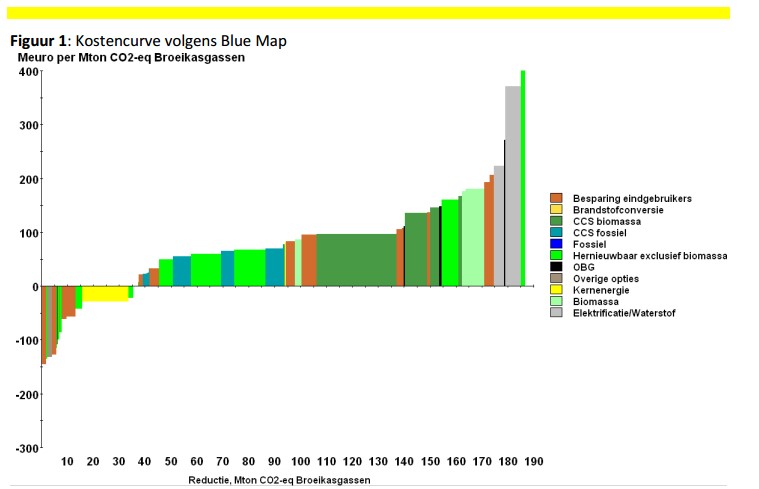The value of CO2
25 May 2018 • Ype Wijnia and John de Croon
planning

|
667 persons
like this column |
After all the sidesteps of the past weeks, it's time to start working as an asset manager again. That means that we have to make choices. Which solution will we use in which order? To be able to make such an order, it is necessary to be able to express everything on one scale, otherwise better / worse has no meaning. Now we can happily praise ourselves that it seems that we already have some experience. Through our business value model we can convert everything into a monetary equivalent. We can calculate this back into a net present value and a yield. With the yield we can make the requested order. The only question that still remains for us: what is the value of CO2 that we will use?
A number of sources can be found for these values. You can see on the one hand what the cost price of the product is. There is quite a spread for CO2 there. The cheapest way to make CO2 is to burn coal. That costs 50 euros per tonne and results in 3 tonnes of CO2. The cost price is only 0,017 euros per kg. If you do it a bit big then you can make electricity with it, and then you keep your net money. CO2 thus has a negative value of -0.07 euros[1]. Close to this comes to set fire to a piece of nature, which is free[2]. Other fuels are more expensive and deliver less CO2, so that will cost money. The most expensive fuel is probably diamond (also pure carbon after all), then you talk about approximately 10.000 euros per gram. Industrial diamonds are a bit cheaper at 50 euros per gram, but still 1 million times as expensive as coal.

The second way is find out what people want to pay for CO2. Now, as a result of the Kyoto agreement for energy-intensive companies, an auction was set up: the European Union Emission Trading System or ETS. The maximum amount of emissions per country is limited[3]. The idea was that you needed a price of about 25 euros per tonne to have an effect. Now markets sometimes have the tendency to listen only to invisible hands and not to ideas. The market price has not been at this level for years, but swings around 6 euros[4], as shown. But according to many experts it should be 50 euros or more. For example, the Dutch PBL and CPB planning agencies believe that in order to keep the temperature rise on earth below 20 Celsius, a minimum price of 60 euros per tonne is required[5], an amount that the Municipality of Amsterdam also uses[6]. Then it will be worthwhile to collect CO2 and store it instead of allowing it to escape to the atmosphere.
This brings us directly to the third way of charging CO2, namely what it costs to clean it up again. That is in this case to retrieve it from the air. Estimates for these costs can amount to something like 1000 euros per tonne CO2 or a euro per kg, as we saw last week.
This variation in prices makes it difficult to choose the right value. Suppose that you value CO2 at 1 euro per kg, then for an average family in the Netherlands this amounts to an environmental burden of 15.000 euro per year[7]. Then you do nothing more than to pay taxes and you do not emit CO2 any more, so such a price is not necessary. But if you make the price too low, achieving an emissions-free world will never be achieved. The way to find the right answer here is as an asset manager to order all possibilities to limit CO2 on yield, including the potential in tonnes of CO2. This so-called abatement curve is also used for example on the Dutch Power Exchange APX, to determine the electricity price on the spot market. In the chart below of ECN / SEO, CO2 is included for the Netherlands[8].

This curve goes up to 200 megatons. This is also about the current emissions of the Netherlands. The highest price of 400 euros per tonne is therefore necessary to limit the warming to 2°C[9]. In order to further limit the increase, you would have to get CO2 out of the air at a given moment, against the aforementioned 1000 euros per tonne. This is also the upper limit that the CPB uses (see footnote 5).
What would that 1000 euro per tonne actually mean? To keep it close to home, a liter of petrol or diesel would then become 3 euros more expensive. That is, especially for the better petrol head, sturdy. On the other hand, it is not insurmountable and would imply a huge incentive to drive and live more economically. We may have to sleep over that one night. Until you realize that we have been paying such amounts for a long time. The CO2 tax on passenger cars in the Netherlands is € 458 per gram per kilometer in the highest bracket. Calculating with 225.000 km per car, this amounts to about 2000 euros per tonne of CO2. A levy of 1 euro per kg of CO2 would therefore mean a halving. With that sunny prospect we do another round: bruised water to be specific.
[1] 0,8 kg CO2 per kWh or 1,25 kWh per kg CO2 with generation cost of about € 0,06 per kWh (figures see e.g. https://wisenederland.nl/groene-stroom/dossier-kolen) resulting in -€ 0,07
[2] Though: https://www.nu.nl/buitenland/5276555/amerikaanse-tiener-krijgt-31-miljoen-euro-boete-natuurbrand.html?redirect=1
[3] https://nl.wikipedia.org/wiki/Emissiehandel, which is also applicable for SOx and NOx
[4] https://www.cbs.nl/nl-nl/maatschappij/natuur-en-milieu/groene-groei/groene-beleidsinstrumenten/indicatoren/co2-prijs-emissiehandel
[5] https://www.cpb.nl/sites/default/files/omnidownload/CPB-PBL-Achtergronddocument-23nov2016-WLO-klimaatscenarios-en-de-waardering-van-co2-uitstoot-in-mkbas.pdf; figure of 2015
[6] https://groenlinks.nl/nieuws/breng-een-re%C3%ABle-prijs-voor-co2-rekening. Incidentally, the former Obama government in the United States in 'The social cost of carbon' amounted to $ 37 per ton, roughly the same order of magnitude
[7] See website “Milieucentraal” where examples of emissions are given for some family situations. For a family with 2 children about 15 tons of CO2 per year
[8] https://www.ecn.nl/publications/PdfFetch.aspx?nr=ECN-E--12-008
[9] http://www.pbl.nl/sites/default/files/cms/publicaties/pbl-2017-nationale-kosten-energietransitie-in-2030-2888.pdf
John de Croon and Ype Wijnia are partner at AssetResolutions BV, a company they co-founded. Periodically they give their vision on an aspect of asset management in a column. The columns are published on the website of AssetResolutions, http://www.assetresolutions.nl/en/column
<< back to overview
|


